高中英语外研版必修4 Module3 Body Language and Non-verbal Communication Grammar 课件(共40张PPT)
文档属性
| 名称 | 高中英语外研版必修4 Module3 Body Language and Non-verbal Communication Grammar 课件(共40张PPT) | 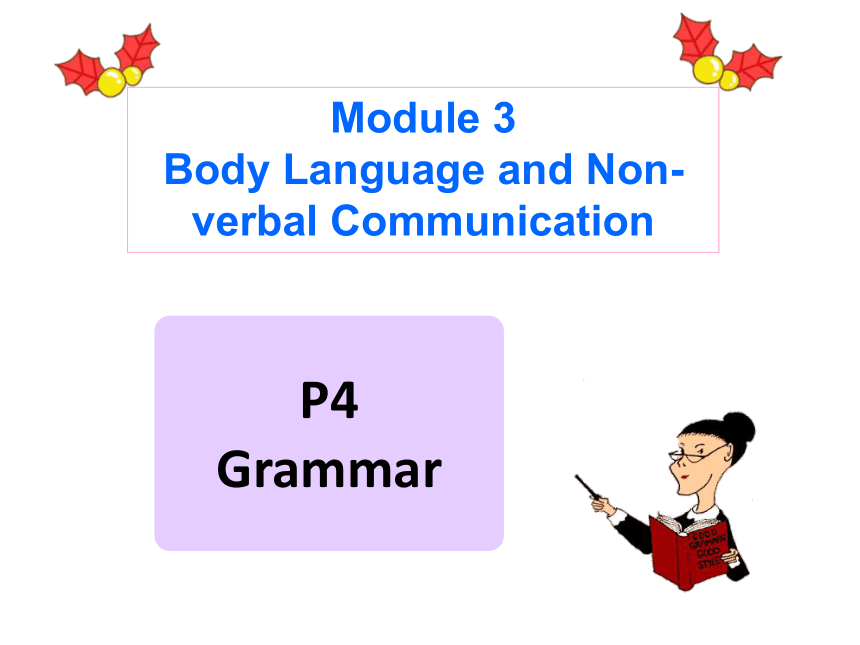 | |
| 格式 | zip | ||
| 文件大小 | 401.9KB | ||
| 资源类型 | 教案 | ||
| 版本资源 | 外研版 | ||
| 科目 | 英语 | ||
| 更新时间 | 2019-05-08 15:01:45 | ||
图片预览

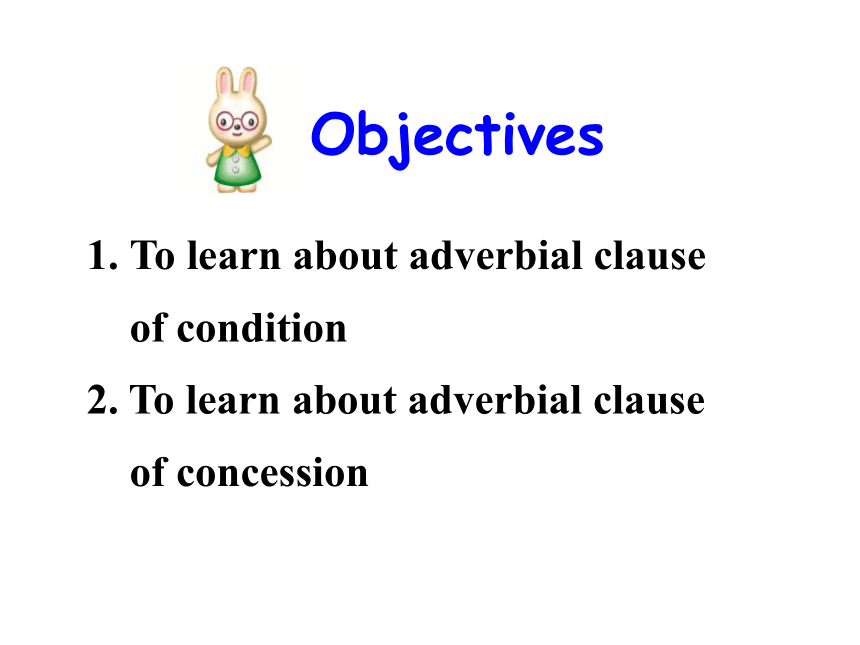
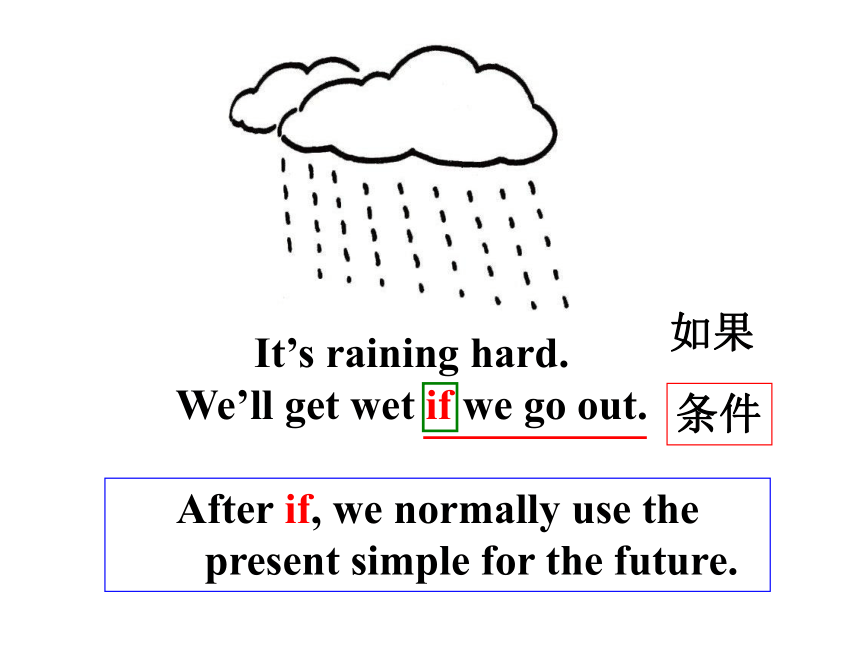
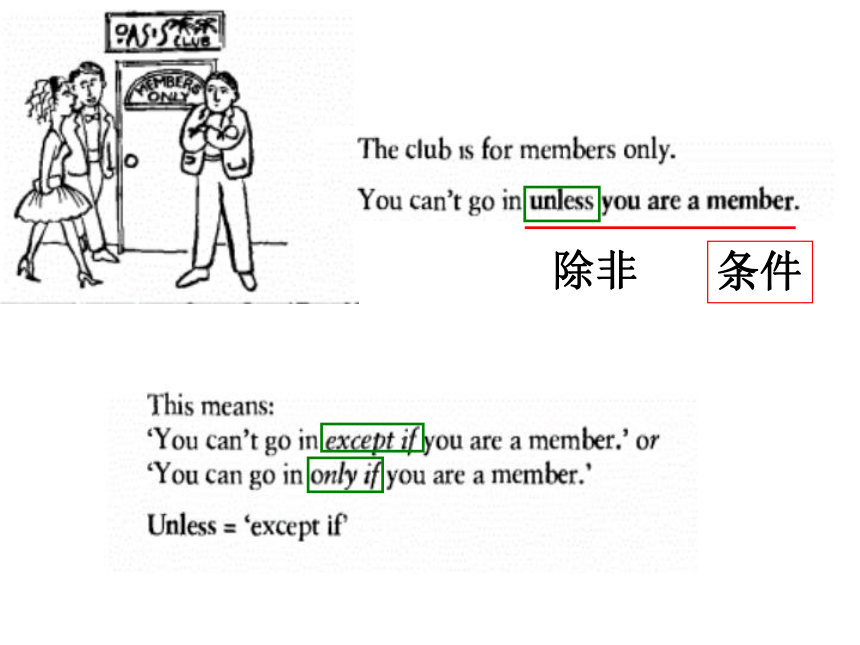
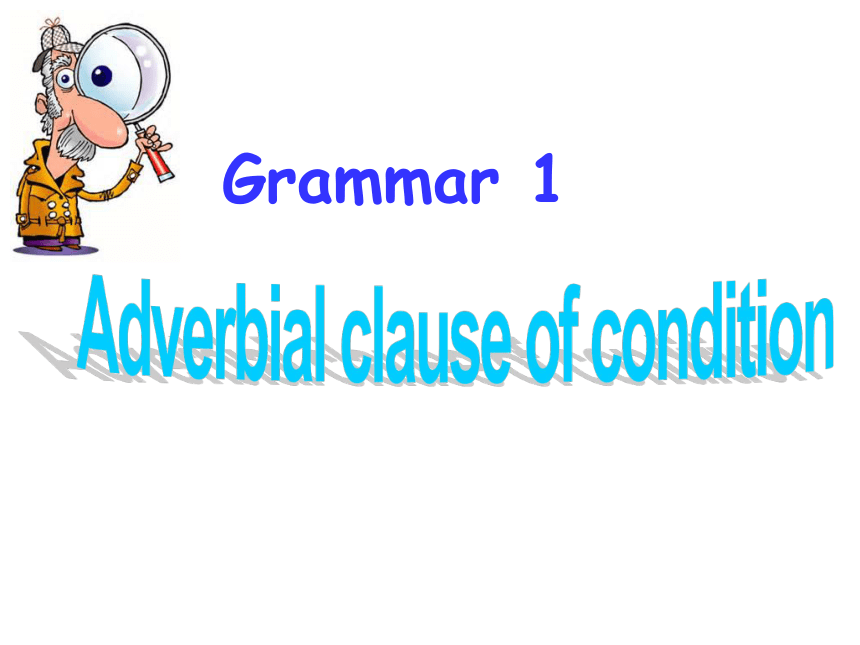
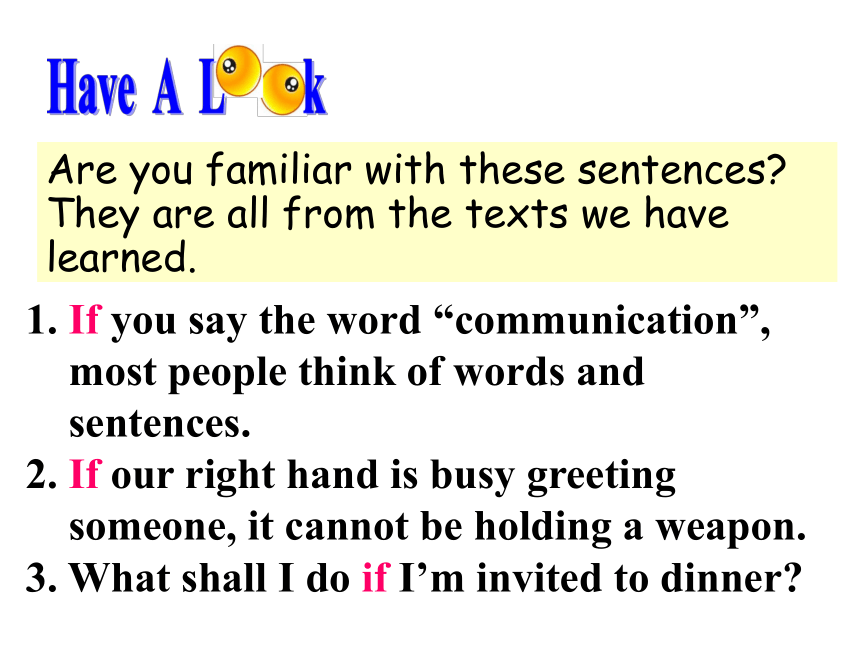
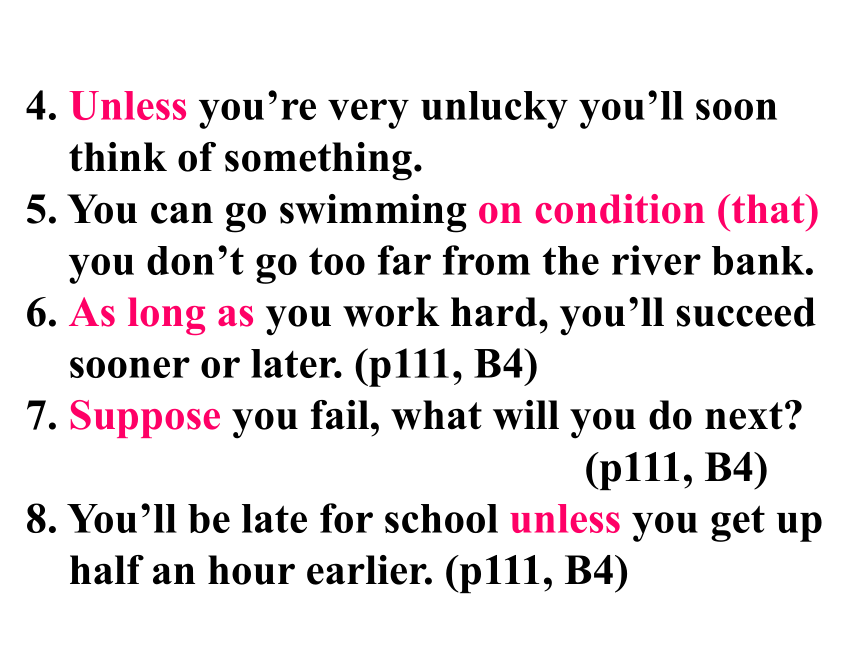
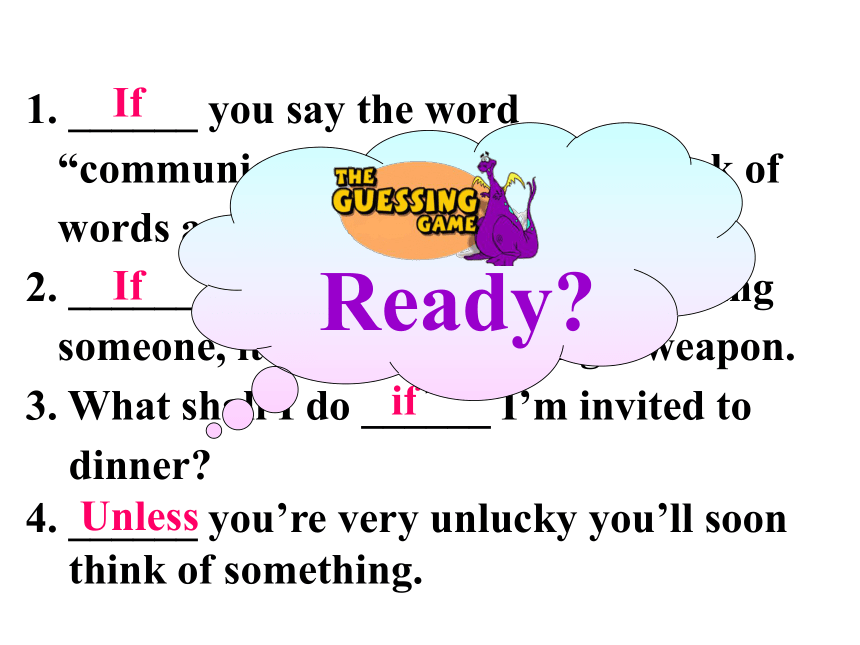

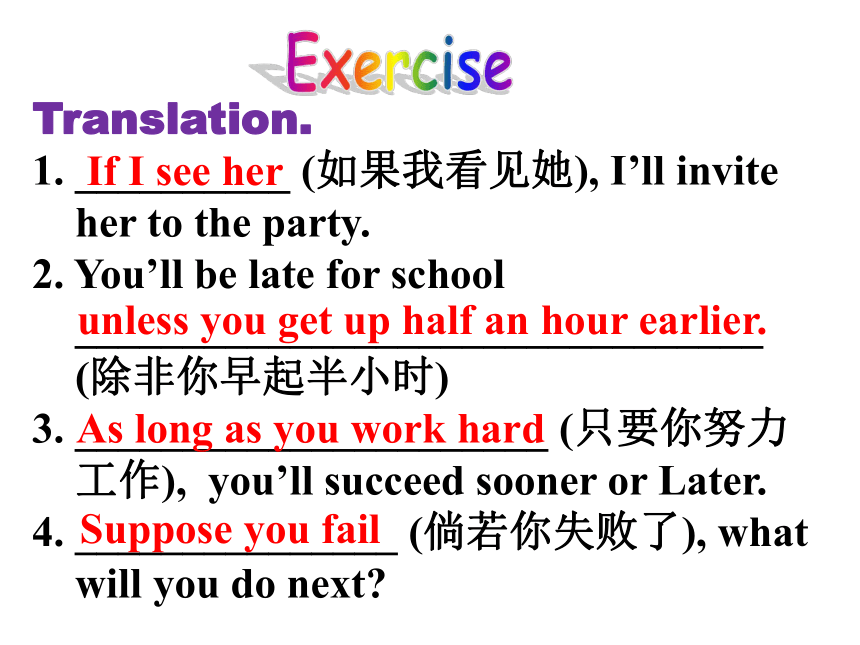
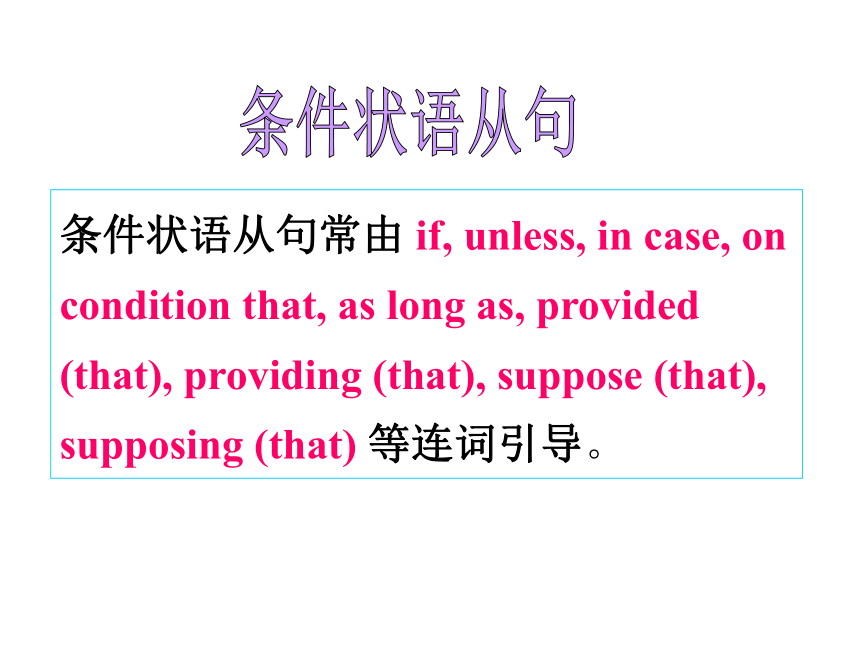
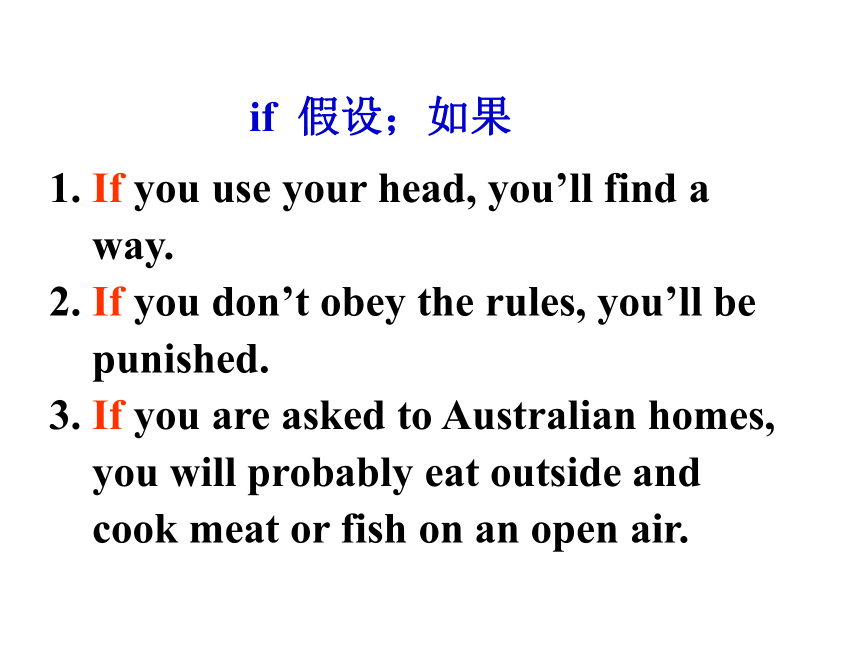
文档简介
课件40张PPT。Module 3
Body Language and Non-verbal Communication P4
GrammarObjectivesTo learn about adverbial clause of condition
2. To learn about adverbial clause of concessionIt’s raining hard.
We’ll get wet if we go out.After if, we normally use the present simple for the future.条件如果条件除非Adverbial clause of conditionGrammar 11. If you say the word “communication”,
most people think of words and
sentences.
2. If our right hand is busy greeting
someone, it cannot be holding a weapon.
3. What shall I do if I’m invited to dinner?Are you familiar with these sentences? They are all from the texts we have learned. 4. Unless you’re very unlucky you’ll soon
think of something.
5. You can go swimming on condition (that)
you don’t go too far from the river bank.
6. As long as you work hard, you’ll succeed
sooner or later. (p111, B4)
7. Suppose you fail, what will you do next?
(p111, B4)
8. You’ll be late for school unless you get up
half an hour earlier. (p111, B4)1. ______ you say the word “communication”, most people think of words and sentences.
2. ______ our right hand is busy greeting someone, it cannot be holding a weapon.
3. What shall I do ______ I’m invited to
dinner?
4. ______ you’re very unlucky you’ll soon
think of something.IfIfifUnlessgo
Ready?5. You can go swimming _______________
you don’t go too far from the river bank.
6. ___________ you work hard, you’ll
succeed sooner or later.
7. _________ you fail, what will you do next?
8. You’ll be late for school _______ you get
up half an hour earlier. on condition (that)As long asSupposeunless1. __________ (如果我看见她), I’ll invite
her to the party.
2. You’ll be late for school
________________________________
(除非你早起半小时)
3. ______________________ (只要你努力
工作), you’ll succeed sooner or Later.
4. _______________ (倘若你失败了), what
will you do next?If I see herAs long as you work hardSuppose you failunless you get up half an hour earlier.Translation.Exercise条件状语从句常由 if, unless, in case, on condition that, as long as, provided (that), providing (that), suppose (that), supposing (that) 等连词引导。条件状语从句1. If you use your head, you’ll find a
way.
2. If you don’t obey the rules, you’ll be
punished.
3. If you are asked to Australian homes,
you will probably eat outside and
cook meat or fish on an open air.if 假设;如果1. As / So long as we don’t lose heart, we’ll
find a way to overcome the difficulty.
2. So long as you keep the book clean, you
may borrow it. as/so long as 只要in case 如果In case he gives me a phone call, tell
him that I will call him back.1. Don’t come unless I telephone.
2. You will fail unless you work hard.1. Supposing she doesn’t come, what
shall we do?
2. Supposing he can’t come, who will
do the work?unless 除非supposing 假设1. She will go provided her friends can
go also.
2. He will do the work providing you
pay him.provided 如果有些条件句可省略某些成分或改成短语:
1. If necessary, ring me at home.
2. He will come if asked.
3. In case of fire, ring the bell.
4. He would never do this unless forced.
5. If in doubt, contact our local office.Review 引导条件状语从句的从属连词有:if; unless; on condition that; as long as; suppose/ supposing …。虽然“退一步说……”的感觉 Adverbial clause of concessionGrammar 2Adverbial clause of concession Although these are very important, we
communicate with more than just
spoken and written words.
2. Whatever you do, don’t leave
immediately after the meal is finished.
3. However hungry you are, you shouldn’t
start to eat before your host does.Are you familiar with these sentences? They are all from the texts we have learned. 4. We’ll make a trip even if/though the
weather is bad.
5. No matter what happened, he would not
mind. (=Whatever happened, he would
not mind.)
6. You’ll have to attend the wedding
whether you’re free or busy.
7. Although developed countries give some financial help, they need to give much more. (p12, B3)1. _________ these are very important, we
communicate with more than just
spoken and written words.
2. _________ you do, don’t leave
immediately after the meal is finished.
3. ________ hungry you are, you shouldn’t
start to eat before your host does.AlthoughWhateverHowevergo
Ready?4. We’ll make a trip _____________ the
weather is bad.
5. ______________ happened, he would not
mind. (=__________ happened, he would
not mind.)
6. You’ll have to attend the wedding
_______ you’re free _______ busy.
7. __________ developed countries give some financial help, they need to give much more. even if/thoughNo matter whatWhateverAlthough whether or1. _______________________ (无论我多么
饥饿), I never seem to be able to finish
off a whole pizza.
2. _______________ (无论你做什么), I’ll
not forgive you.
3. ____________________ (无论我何时
感到孤独), I think about you.However hungry I amWhatever you doWhenever I feel lonelyTranslation.Exercise4. You can’t come in , _______________.
(无论你是谁)
5. ______________________ (尽管他们很
疲惫), they went on with their work.
6. _______________________ (尽管她努
力尝试), nothing seemed to work.
7. They will stand by you ____________
_________. (即使你没成功)whoever you areAlthough they were tiredeven if you don’tHowever hard she tried succeed 引导让步状语从句常用的连词有:though(虽然), although (虽然),as(虽然),even if(即使),even though(即使),whatever(无论什么),wherever(无论哪里),no matter wh…(无论…)。让步状语从句 He went out, even though it was
raining.
2. He felt all this, even if he didn’t find
phrases to express it.
3. Much as I like it, I won’t buy it, for it’s too expensive.
4. No matter who asks for advice, she is
always ready to help. 1. as引导的让步状语从句,语序发生倒装。
Child as he is, he knows a lot.
虽然他是个孩子,他懂得很多。
(表语child提前,而且冠词a省略)
Much as I admire him, I cannot excuse
his faults.
虽然我很崇拜他,可我不能原谅他的
错误。(状语much提前) Try hard as he will, he never seems able to do the work satisfactorily.
(谓语动词Try 及副词hard提前)
= Though he tries hard, he never seems…
虽然他尽了努力,但他的工作总做的不
尽人意。2. 当有though, although时,后面的从句
不能有but,但是 though 和yet可连用。
Although it’s raining, they are still
working in the field.
虽然在下雨,但他们仍在地里干活。
Mary is a nice girl, but she has one
shortcoming.
玛丽是一个好姑娘,但她有一个缺点。3. 在 however引导的让步状语从句中,however常修饰形容词或副词,从句的语序为: however+形容词 /副词 +其他成分(陈述语序)。 However hard it rains, we shall go home tonight.
无论雨下得有多大,今晚我们都要回家。 however还可用于:
however+形容词+a+可数名词单数+其他成分(陈述语序)。 However long a vacation is, I always feel I want a few days more.
无论假期有多长,我总觉得想再多休息几天。4. 让步状语从句中的省略。
当从句主语与主句主语一致或从句主语为 it,且从句的谓语有动词be时,可以省略从句的主语和be。 Though cold, the old man still wore a
vest.
Whether well or sick, he always keeps
smiling. Review 引导让步状语从句的从属连词有:though; as; even if; even though; -ever; no matter-/…。Ⅰ. 选择适当的连词填空。1. Could you post the letter for me________ you go to the post office? 2. __________ I respect him very much, I cannot agree with him. 3. Much _________ I like it, I won’t buy it. It’s too expensive for me.unless, although, as, however, if, whatever, whoever, wherever, whenever, even ififAlthoughasunless, although, as, however, if, whatever, whoever, wherever, whenever, even if4. ________ hard it is, we will complete the task on time. 5. _________ wants to speak to me on the phone, tell him I’m busy. 6. Jim will try his best to reach his goal, ________ difficulty he may meet. 7. Try to read and speak in English _________you can.HoweverWhoeverwhateverwheneverunless, although, as, however, if, whatever, whoever, wherever, whenever, even if8. We plan to take a boat and camp _______ we like. 9. ________ you disagree with her, she is worth listening to. 10. She won’t lose weight ________ she goes on a diet and takes exercise every day.whereverEven ifunlessII. 阅读下面短文,按照上下文连贯的要求,在空格处填入一个适当的单词。
Body language can be described as anything that communicates something to somebody else _______ the use of words. This isn’t just gesture or universal sign language; body language is also shown through facial expressions, a voice, eye contact and many others. Anything that another person does and that you get a message from is considered body language. without For example, ______ you ask someone a question, they answer you and then look away quickly. It is an indication that they’re probably lying, at least in part. This isn’t one hundred percent correct, ______; if they’re just extremely nervous or shy they may very well have the same reaction. There have been many books and studies on the subject of body language; ________, in each case there are certain indications that mean the same thing. It is useful to learn what these are and practice paying attention to them _______ you’re talking to people.ifthoughhoweverwhileFinish the exercises in Learning English.
Body Language and Non-verbal Communication P4
GrammarObjectivesTo learn about adverbial clause of condition
2. To learn about adverbial clause of concessionIt’s raining hard.
We’ll get wet if we go out.After if, we normally use the present simple for the future.条件如果条件除非Adverbial clause of conditionGrammar 11. If you say the word “communication”,
most people think of words and
sentences.
2. If our right hand is busy greeting
someone, it cannot be holding a weapon.
3. What shall I do if I’m invited to dinner?Are you familiar with these sentences? They are all from the texts we have learned. 4. Unless you’re very unlucky you’ll soon
think of something.
5. You can go swimming on condition (that)
you don’t go too far from the river bank.
6. As long as you work hard, you’ll succeed
sooner or later. (p111, B4)
7. Suppose you fail, what will you do next?
(p111, B4)
8. You’ll be late for school unless you get up
half an hour earlier. (p111, B4)1. ______ you say the word “communication”, most people think of words and sentences.
2. ______ our right hand is busy greeting someone, it cannot be holding a weapon.
3. What shall I do ______ I’m invited to
dinner?
4. ______ you’re very unlucky you’ll soon
think of something.IfIfifUnlessgo
Ready?5. You can go swimming _______________
you don’t go too far from the river bank.
6. ___________ you work hard, you’ll
succeed sooner or later.
7. _________ you fail, what will you do next?
8. You’ll be late for school _______ you get
up half an hour earlier. on condition (that)As long asSupposeunless1. __________ (如果我看见她), I’ll invite
her to the party.
2. You’ll be late for school
________________________________
(除非你早起半小时)
3. ______________________ (只要你努力
工作), you’ll succeed sooner or Later.
4. _______________ (倘若你失败了), what
will you do next?If I see herAs long as you work hardSuppose you failunless you get up half an hour earlier.Translation.Exercise条件状语从句常由 if, unless, in case, on condition that, as long as, provided (that), providing (that), suppose (that), supposing (that) 等连词引导。条件状语从句1. If you use your head, you’ll find a
way.
2. If you don’t obey the rules, you’ll be
punished.
3. If you are asked to Australian homes,
you will probably eat outside and
cook meat or fish on an open air.if 假设;如果1. As / So long as we don’t lose heart, we’ll
find a way to overcome the difficulty.
2. So long as you keep the book clean, you
may borrow it. as/so long as 只要in case 如果In case he gives me a phone call, tell
him that I will call him back.1. Don’t come unless I telephone.
2. You will fail unless you work hard.1. Supposing she doesn’t come, what
shall we do?
2. Supposing he can’t come, who will
do the work?unless 除非supposing 假设1. She will go provided her friends can
go also.
2. He will do the work providing you
pay him.provided 如果有些条件句可省略某些成分或改成短语:
1. If necessary, ring me at home.
2. He will come if asked.
3. In case of fire, ring the bell.
4. He would never do this unless forced.
5. If in doubt, contact our local office.Review 引导条件状语从句的从属连词有:if; unless; on condition that; as long as; suppose/ supposing …。虽然“退一步说……”的感觉 Adverbial clause of concessionGrammar 2Adverbial clause of concession Although these are very important, we
communicate with more than just
spoken and written words.
2. Whatever you do, don’t leave
immediately after the meal is finished.
3. However hungry you are, you shouldn’t
start to eat before your host does.Are you familiar with these sentences? They are all from the texts we have learned. 4. We’ll make a trip even if/though the
weather is bad.
5. No matter what happened, he would not
mind. (=Whatever happened, he would
not mind.)
6. You’ll have to attend the wedding
whether you’re free or busy.
7. Although developed countries give some financial help, they need to give much more. (p12, B3)1. _________ these are very important, we
communicate with more than just
spoken and written words.
2. _________ you do, don’t leave
immediately after the meal is finished.
3. ________ hungry you are, you shouldn’t
start to eat before your host does.AlthoughWhateverHowevergo
Ready?4. We’ll make a trip _____________ the
weather is bad.
5. ______________ happened, he would not
mind. (=__________ happened, he would
not mind.)
6. You’ll have to attend the wedding
_______ you’re free _______ busy.
7. __________ developed countries give some financial help, they need to give much more. even if/thoughNo matter whatWhateverAlthough whether or1. _______________________ (无论我多么
饥饿), I never seem to be able to finish
off a whole pizza.
2. _______________ (无论你做什么), I’ll
not forgive you.
3. ____________________ (无论我何时
感到孤独), I think about you.However hungry I amWhatever you doWhenever I feel lonelyTranslation.Exercise4. You can’t come in , _______________.
(无论你是谁)
5. ______________________ (尽管他们很
疲惫), they went on with their work.
6. _______________________ (尽管她努
力尝试), nothing seemed to work.
7. They will stand by you ____________
_________. (即使你没成功)whoever you areAlthough they were tiredeven if you don’tHowever hard she tried succeed 引导让步状语从句常用的连词有:though(虽然), although (虽然),as(虽然),even if(即使),even though(即使),whatever(无论什么),wherever(无论哪里),no matter wh…(无论…)。让步状语从句 He went out, even though it was
raining.
2. He felt all this, even if he didn’t find
phrases to express it.
3. Much as I like it, I won’t buy it, for it’s too expensive.
4. No matter who asks for advice, she is
always ready to help. 1. as引导的让步状语从句,语序发生倒装。
Child as he is, he knows a lot.
虽然他是个孩子,他懂得很多。
(表语child提前,而且冠词a省略)
Much as I admire him, I cannot excuse
his faults.
虽然我很崇拜他,可我不能原谅他的
错误。(状语much提前) Try hard as he will, he never seems able to do the work satisfactorily.
(谓语动词Try 及副词hard提前)
= Though he tries hard, he never seems…
虽然他尽了努力,但他的工作总做的不
尽人意。2. 当有though, although时,后面的从句
不能有but,但是 though 和yet可连用。
Although it’s raining, they are still
working in the field.
虽然在下雨,但他们仍在地里干活。
Mary is a nice girl, but she has one
shortcoming.
玛丽是一个好姑娘,但她有一个缺点。3. 在 however引导的让步状语从句中,however常修饰形容词或副词,从句的语序为: however+形容词 /副词 +其他成分(陈述语序)。 However hard it rains, we shall go home tonight.
无论雨下得有多大,今晚我们都要回家。 however还可用于:
however+形容词+a+可数名词单数+其他成分(陈述语序)。 However long a vacation is, I always feel I want a few days more.
无论假期有多长,我总觉得想再多休息几天。4. 让步状语从句中的省略。
当从句主语与主句主语一致或从句主语为 it,且从句的谓语有动词be时,可以省略从句的主语和be。 Though cold, the old man still wore a
vest.
Whether well or sick, he always keeps
smiling. Review 引导让步状语从句的从属连词有:though; as; even if; even though; -ever; no matter-/…。Ⅰ. 选择适当的连词填空。1. Could you post the letter for me________ you go to the post office? 2. __________ I respect him very much, I cannot agree with him. 3. Much _________ I like it, I won’t buy it. It’s too expensive for me.unless, although, as, however, if, whatever, whoever, wherever, whenever, even ififAlthoughasunless, although, as, however, if, whatever, whoever, wherever, whenever, even if4. ________ hard it is, we will complete the task on time. 5. _________ wants to speak to me on the phone, tell him I’m busy. 6. Jim will try his best to reach his goal, ________ difficulty he may meet. 7. Try to read and speak in English _________you can.HoweverWhoeverwhateverwheneverunless, although, as, however, if, whatever, whoever, wherever, whenever, even if8. We plan to take a boat and camp _______ we like. 9. ________ you disagree with her, she is worth listening to. 10. She won’t lose weight ________ she goes on a diet and takes exercise every day.whereverEven ifunlessII. 阅读下面短文,按照上下文连贯的要求,在空格处填入一个适当的单词。
Body language can be described as anything that communicates something to somebody else _______ the use of words. This isn’t just gesture or universal sign language; body language is also shown through facial expressions, a voice, eye contact and many others. Anything that another person does and that you get a message from is considered body language. without For example, ______ you ask someone a question, they answer you and then look away quickly. It is an indication that they’re probably lying, at least in part. This isn’t one hundred percent correct, ______; if they’re just extremely nervous or shy they may very well have the same reaction. There have been many books and studies on the subject of body language; ________, in each case there are certain indications that mean the same thing. It is useful to learn what these are and practice paying attention to them _______ you’re talking to people.ifthoughhoweverwhileFinish the exercises in Learning English.
